#glaeser
Explore tagged Tumblr posts
Text
Construir ciudades es difícil, y la densidad acarrea costos además de beneficios. Sin embargo, vale la pena soportar esos costos, porque nuestra cultura, nuestra prosperidad y nuestra libertad son, en última instancia, fruto de personas que viven, trabajan y piensan juntas, y ahí reside el triunfo supremo de la ciudad.
Triunfo de las ciudades - Edward Glaeser.

Enlace del libro: https://drive.google.com/file/d/1Z6UwGZcSAbt5IzmzqnJaXI-lqByfZ8HH/view?usp=sharing
0 notes
Text


In 1971 German architect/engineer Frei Otto (1925-2015) was honored with an exhibition at the Museum of Modern Art in New York, directed by Ludwig Glaeser and followed by the present eponymous catalogue, published by MoMA in 1972. The exhibition took a place at a time when Otto had already established his Institut für leichte Flächentragwerke at Stuttgart University, designed the German pavilion at Expo 67 in Montreal but arguably his most prominent work, the Olympic Stadium and adjacent facilities of the 1972 Olympics in Munich wasn’t yet completed. Still, the catalogue includes Frei Otto’s models of the latter project just as well as numerous other models and completed works from the 1950s and 1960s.
The catalogue is a wonderful, richly illustrated historic document that showcases some two decades of Frei Otto’s already impressive work and I was more than happy when I read the recent newsletter of Fachbuchhandlung Karl Krämer in Stuttgart: they announced that they had received some copies of the catalogue from the vaults of the Institut für leichte Flächentragwerke. Luckily I ordered soon enough to finally be able to add the volume to my library!
#frei otto#architecture book#structural engineering#architecture#germany#nachkriegsarchitektur#nachkriegsmoderne#book#vintage book#museum of modern art
27 notes
·
View notes
Text
Something is happening in the housing market that really shouldn’t be. Everyone familiar with America’s affordability crisis knows that it is most acute in ultra-progressive coastal cities in heavily Democratic states. And yet, home prices have been rising most sharply in the exact places that have long served as a refuge for Americans fed up with the spiraling cost of living. Over the past decade, the median home price has increased by 134 percent in Phoenix, 133 percent in Miami, 129 percent in Atlanta, and 99 percent in Dallas. (Over that same stretch, prices in New York, San Francisco, and Los Angeles have increased by about 75 percent, 76 percent, and 97 percent, respectively).
This trend could prove disastrous. For much of the past half century, suburban sprawl across the Sun Belt was a kind of pressure-release valve for the housing market. People who couldn’t afford to live in expensive cities had other, cheaper places to go. Now even the affordable alternatives are on track to become out of reach for a critical mass of Americans.
The trend also presents a mystery. According to expert consensus, anti-growth liberals have imposed excessive regulations that made building enough homes impossible. The housing crisis has thus become synonymous with feckless blue-state governance. So how can prices now be rising so fast in red and purple states known for their loose regulations?
A tempting explanation is that the expert consensus is wrong. Perhaps regulations and NIMBYism were never really the problem, and the current push to reform zoning laws and building codes is misguided. But the real answer is that San Francisco and New York weren’t unique—they were just early. Eventually, no matter where you are, the forces of NIMBYism catch up to you.
The perception of the Sun Belt as the anti-California used to be accurate. In a recent paper, two urban economists, Ed Glaeser and Joe Gyourko, analyze the rate of housing production across 82 metro areas since the 1950s. They find that as recently as the early 2000s, booming cities such as Dallas, Atlanta, and Phoenix were building new homes at more than four times the rate of major coastal cities such as San Francisco, Los Angeles, and New York, on average. The fact that millions of people were being priced out of the locations with the best jobs and highest wages—so-called superstar cities—wasn’t ideal. But the Sun Belt building boom kept the coastal housing shortage from becoming a full-blown national crisis.
No longer. Although the Sun Belt continues to build far more housing than the coasts in absolute terms, Glaeser and Gyourko find that the rate of building in most Sun Belt cities has fallen by more than half over the past 25 years, in some cases by much more, even as demand to live in those places has surged. “When it comes to new housing production, the Sun Belt cities today are basically at the point that the big coastal cities were 20 years ago,” Gyourko told me. This explains why home prices in the Sun Belt, though still low compared with those in San Francisco and New York, have risen so sharply since the mid-2010s—a trend that accelerated during the pandemic, as the rise of remote work led to a large migration out of high-cost cities.
In a properly functioning housing market, the post-COVID surge in demand should have generated a massive building boom that would have cooled price growth. Instead, more than five years after the pandemic began, these places still aren’t building enough homes, and prices are still rising wildly.
As the issue of housing has become more salient in Democratic Party politics, some commentators have pointed to rising costs in the supposedly laissez-faire Sun Belt as proof that zoning laws and other regulations are not the culprit. “Blaming zoning for housing costs seems especially blinkered because different jurisdictions in the United States have very different approaches to land use regulations, and yet the housing crisis is a nationwide phenomenon,” the Vanderbilt University law professors Ganesh Sitaraman and Christopher Serkin write in a recent paper. Some argue that the wave of consolidation within the home-building industry following the 2008 financial crisis gave large developers the power to slow-walk development and keep prices high. Others say that the cost of construction has climbed so high over the past two decades that building no longer makes financial sense for developers.
Both of those claims probably account for part of the growth in housing costs, but they fall short as the main explanation. The home-building industry has indeed become more concentrated since 2008, but the slowdown in housing production in the Sun Belt began well before that. If the problem were a monopolistic market, you would expect to see higher profit margins for builders, yet Glaeser and Gyourko find that developer profits have remained roughly constant. (Other sources agree.) Likewise, construction and financing costs have risen sharply since the early 2000s—but not to the point where builders can’t turn a profit. In fact, Glaeser and Gyourko find that the share of homes selling far above the cost of production in major Sun Belt markets has dramatically increased. Put another way, there are even more opportunities for home builders to make a profit in these places; something is preventing them from taking advantage.
The Sun Belt, in short, is subject to the same antidevelopment forces as the coasts; it just took longer to trigger them. Cities in the South and Southwest have portrayed themselves as business-friendly, pro-growth metros. In reality, their land-use laws aren’t so different from those in blue-state cities. According to a 2018 research paper, co-authored by Gyourko, that surveyed 44 major U.S. metro areas, land-use regulations in Miami and Phoenix both ranked in the top 10 most restrictive (just behind Washington, D.C., and L.A. and ahead of Boston), and Dallas and Nashville were in the top 25. Because the survey is based on responses from local governments, it might understate just how bad zoning in the Sun Belt is. “When I first opened up the zoning code for Atlanta, I almost spit out my coffee,” Alex Armlovich, a senior housing-policy analyst at the Niskanen Center, a centrist think tank, told me. “It’s almost identical to L.A. in the 1990s.”
These restrictive rules weren’t a problem back when Sun Belt cities could expand by building new single-family homes at their exurban fringes indefinitely. That kind of development is less likely to be subject to zoning laws; even when it is, obtaining exceptions to those laws is relatively easy because neighbors who might oppose new development don’t exist yet. Recently, however, many Sun Belt cities have begun hitting limits to their outward sprawl, either because they’ve run into natural obstacles (such as the Everglades in Miami and tribal lands near Phoenix) or because they’ve already expanded to the edge of reasonable commute distances (as appears to be the case in Atlanta and Dallas). To keep growing, these cities will have to find ways to increase the density of their existing urban cores and suburbs. That is a much more difficult proposition. “This is exactly what happened in many coastal cities in the 1980s and ’90s,” Armlovich told me. “Once you run out of room to sprawl, suddenly your zoning code starts becoming a real limitation.”
Glaeser and Gyourko go one step further. They hypothesize that as Sun Belt cities have become more affluent and highly educated, their residents have become more willing and able to use existing laws and regulations to block new development. They point to two main pieces of evidence. First, for a given city, the slowdown in new housing development strongly correlates with a rising share of college-educated residents. Second, within cities, the neighborhoods where housing production has slowed the most are lower-density, affluent suburbs populated with relatively well-off, highly educated professionals. In other words, anti-growth NIMBYism might be a perverse but natural consequence of growth: As demand to live in a place increases, it attracts the kind of people who are more likely to oppose new development, and who have the time and resources to do so. “We used to think that people in Miami, Dallas, Phoenix behaved differently than people in Boston and San Francisco,” Gyourko told me. “That clearly isn’t the case.”
Real-world examples aren’t hard to find. In early 2024, an affordable-housing developer proposed a project for an 85-unit apartment building in an affluent suburb of San Antonio. The apartments would have consisted entirely of subsidized units reserved for low-income residents, and the building would have included an on-site preschool. The project had buy-in from the city government, but a handful of local residents opposed it, citing concerns such as traffic, crime, and the height of the building. “It’s too much—we’re turning into Houston,” one nearby resident told the planning commission in April. “I would appreciate if you all would keep San Antonio residential and feeling like home.”
Those residents took advantage of a 1927 Texas law known as the “valid petition,” a procedure originally introduced as a way to preserve segregation after the Supreme Court struck down explicitly racial zoning. Under the law, any effort by a developer to get an exemption from a zoning ordinance (say, to build apartments on land zoned for retail) can be blocked if the owners of just 20 percent of the land within 200 feet of the proposed project site file a petition opposing the effort. At that point, the only way to rescue the project is to summon a three-fourths supermajority vote by the city council. In San Antonio, that meant nine of the city’s 11 council members would need to vote to overturn the valid petition. In the end, only seven did. The project was killed.
Experts told me that from the mid-20th century through the 2000s, valid petitions were hardly used in Texas. But in recent years they have become such a common way to kill new projects that they have earned the nickname “the tyrant’s veto.” They have been wielded against, among other things, a hospital expansion in Dallas, student housing in Bryan, and Habitat for Humanity houses in Austin. According to Nicole Nosek, the chair and founder of Texans for Reasonable Solutions, a pro-housing advocacy organization, the law chills development before it even gets proposed in the first place. “Developers call it ‘the silent killer,’” Nosek told me. “Many of them don’t even try to propose projects in places like East Austin, because they know that one person could stir up enough trouble to kill it altogether.”
Justin Webb, the owner of a small family-owned home-building business in Dallas, told me that when he started out in 1990, the local environment was “every builder’s dream.” Not anymore. “Now everything is a negotiation; everything is a process,” Webb said. He cited a project first proposed in May 2022 to turn a run-down strip mall in North Dallas into a mixed-use development with 2,300 new housing units alongside offices, retail, walking paths, and green space. After three years of local opposition and several contentious community meetings, the proposal has been scaled back to just 868 units. And it faces a lawsuit filed by a local neighborhood association that might kill it altogether. “A lot of times, the last person to move in wants to close the door and throw away the key,” Webb said. “I think that’s what’s happening all over Texas right now.”
Texas isn’t an outlier. Similar anecdotes abound in cities such as Orlando, Las Vegas, Phoenix, Albuquerque, and Atlanta. This trend has turned some of the most developer-friendly cities into absolute nightmares for home builders.
When Mike Vasquez began working for his family’s Arizona-based construction business in the 1980s, he told me, he could walk into the local planning office with a proposal “written on a napkin” and get approval for a new project within hours. Today, that process requires navigating an agonizing thicket of paperwork, regulations, town-hall meetings, neighborhood resistance, and potential lawsuits. Simply breaking ground on a new project can take years, if it gets approved at all. “It used to be the case that if you owned a piece of land, you could just build on it,” Vasquez told me. “Now it takes a year or two just to get the land rezoned so I can start a project. You can’t run a business like that.” So after 43 years of building homes out West, Vasquez has decided to pull up stakes and move across the country to North Carolina, where he has heard it’s still possible to build like in the good old days.
Right now, the same story is playing out again and again across the Sun Belt: Eventually, suburban sprawl runs its course, and cities must face both the restrictiveness of their own land-use laws and the seemingly universal human tendency to put down roots and then oppose new development. If current trends continue, then in 20 years, the housing crisis in cities such as Miami, Phoenix, and Atlanta will be as severe as it is in Los Angeles, San Francisco, and New York today.
The good news is that these cities have been warned. They can look at the crisis plaguing their coastal counterparts, see into their not-so-far-off future, and choose to do something about it. Some already have. In 2021, Raleigh, North Carolina, responded to an influx of new residents by reforming its laws to make building multifamily housing much easier. Over the next three years, the city built 60 percent more units annually and experienced half the rental-cost growth than it had during the previous five years, according to data gathered by Alex Horowitz, the project director for housing policy at the Pew Charitable Trusts.
The forces opposed to new development are just as vehemently opposed to the kind of reforms needed to avert a future crisis. Many local and state governments across the Sun Belt have tried and failed to implement lasting pro-housing reforms. But the recent spike in home prices across the region has put even more pressure on lawmakers to act. The Texas legislature recently passed several pieces of legislation that will, among other things, reduce the minimum lot size of new homes, limit the power of the “tyrant’s veto,” and allow multifamily housing to be built on land currently zoned for offices and retail. Red states like to portray themselves as free from the pathologies that have made housing such a problem in other parts of the country. Now they have an opportunity to prove it.
14 notes
·
View notes
Text

Canicola, by Andrea Faraguna, Bahrain Pavilion, 19th International Architecture Exhibition, La Biennale di Venezia, 2025 ph. Andrea Avezzù VS Ludwig Mies Van Der Rohe, Farnsworth House, Plano | Illinois, USA, 1945-1951, ph. Ludwig Glaeser | Canadian Centre for Architecture, Montréal
#andrea faraguna#bahrain#bahrain pavilion#viennale#venice biennale#venice architecture biennale#Farnsworth House#architecture#modern architecture
11 notes
·
View notes
Text
Interesting Papers for Week 29, 2025
Expectation-dependent stimulus selectivity in the ventral visual cortical pathway. Altavini, T. S., Chen, M., Astorga, G., Yan, Y., Li, W., Freiwald, W., & Gilbert, C. D. (2025). Proceedings of the National Academy of Sciences, 122(13), e2406684122.
The Modulation by the Locus Coeruleus of Recent and Remote Memory Retrieval is Activity‐Dependent. Babushkina, N., & Manahan‐Vaughan, D. (2025). Hippocampus, 35(2).
Manipulation of interoceptive signaling biases decision making in rhesus macaques. Cardenas, M. A., Le, R. P., Champ, T. M., O’Neill, D., Fuglevand, A. J., & Gothard, K. M. (2025). Proceedings of the National Academy of Sciences, 122(13), e2424680122.
Dynamic coding and sequential integration of multiple reward attributes by primate amygdala neurons. Grabenhorst, F., & Báez-Mendoza, R. (2025). Nature Communications, 16, 3119.
Parkinsonism Disrupts Neuronal Modulation in the Presupplementary Motor Area during Movement Preparation. Hendrix, C. M., Baker, H. E., Yu, Y., Schneck, D. D., Wang, J., Johnson, L. A., & Vitek, J. L. (2025). Journal of Neuroscience, 45(13), e1802242025.
Uncertainty estimation with prediction-error circuits. Hertäg, L., Wilmes, K. A., & Clopath, C. (2025). Nature Communications, 16, 3036.
Spatial localization of hippocampal replay requires dopamine signaling. Kleinman, M. R., & Foster, D. J. (2025). eLife, 13, e99678.3.
Cognitive mechanisms of aversive prediction error-induced memory enhancements. Loock, K., Kalbe, F., & Schwabe, L. (2025). Journal of Experimental Psychology: General, 154(4), 1102–1121.
A neural index reflecting the amount of cognitive resources available during memory encoding: A model-based approach. Ma, S., Popov, V., & Zhang, Q. (2025). Journal of Experimental Psychology: Learning, Memory, and Cognition, 51(3), 350–370.
Temporal metacognition: Direct readout or mental construct? The case of introspective reaction time. Pavailler, N., Gevers, W., & Burle, B. (2025). Journal of Experimental Psychology: General, 154(4), 1122–1148.
Bridging the human–AI knowledge gap through concept discovery and transfer in AlphaZero. Schut, L., Tomašev, N., McGrath, T., Hassabis, D., Paquet, U., & Kim, B. (2025). Proceedings of the National Academy of Sciences, 122(13), e2406675122.
Prediction that conflicts with judgment: The low absolute likelihood effect. Sun, C., & LeBoeuf, R. A. (2025). Journal of Experimental Psychology: General, 154(4), 919–934.
The value of initiating a pursuit in temporal decision-making. Sutlief, E., Walters, C., Marton, T., & Hussain Shuler, M. G. (2025). eLife, 13, e99957.3.
Psychometric Properties of the Neural Response to Rewards and Errors Across Mid‐ to Late‐Adolescence. Szenczy, A. K., Sabharwal, A., Levinson, A. R., Infantolino, Z. P., Perlman, G., Kotov, R., Klein, D. N., & Nelson, B. D. (2025). Developmental Psychobiology, 67(2).
Explaining human motor coordination via the synergy expansion hypothesis. Tessari, F., West, A. M., & Hogan, N. (2025). Proceedings of the National Academy of Sciences, 122(13), e2501705122.
Rewards transiently and automatically enhance sustained attention. Trach, J. E., DeBettencourt, M. T., Radulescu, A., & McDougle, S. D. (2025). Journal of Experimental Psychology: General, 154(4), 1063–1079.
Avoiding positivity at a cost: Evidence of reward devaluation in the novel valence selection task. Urena, M., Winer, E. S., & Mills, C. (2025). Journal of Experimental Psychology: General, 154(4), 958–968.
Left–right-alternating theta sweeps in entorhinal–hippocampal maps of space. Vollan, A. Z., Gardner, R. J., Moser, M.-B., & Moser, E. I. (2025). Nature, 639(8056), 995–1005.
Frontal noradrenergic and cholinergic transients exhibit distinct spatiotemporal dynamics during competitive decision-making. Wang, H., Ortega, H. K., Kelly, E. B., Indajang, J., Savalia, N. K., Glaeser-Khan, S., Feng, J., Li, Y., Kaye, A. P., & Kwan, A. C. (2025). Science Advances, 11(13).
The visuomotor transformations underlying target-directed behavior. Zhao, P., Tong, Y., Lazarte, I. P., Khan, B., Tian, G., Chen, K. K. Y., Lam, T. K. C., Hu, Y., & Semmelhack, J. L. (2025). Proceedings of the National Academy of Sciences, 122(13), e2416215122.
#neuroscience#science#research#brain science#scientific publications#cognitive science#neurobiology#cognition#psychophysics#neurons#neural computation#neural networks#computational neuroscience
5 notes
·
View notes
Text

My books have arrived. So far I like the pictures best! Especially the one about the Swedish Cavalry has many nice illustrations! Pants!!! TENTS!!! (The one about the infantry was not reprinted yet when I ordered the books -_-) The biography (left) goes to show once again, that pretty much everyone is just relying on Hatton's Charles XII or her other works (Jeffereys) 😔 she's just unbeatable. At least Glaeser is normal about Karl's sexuality (came to the same conclusion as me that Karl was too busy helicopter parenting his army and Sweden to get with any woman). I am flabbergasted that both the biography and the book specifically about Narva I don't have Adlerfelt's map of it in them?? I guess maybe it's a little busy so they opted for simpler ones, but I think it's really good.
May was mentioned twice in the biography.... once to say he was captured, the other time to remark how generous Karl was with his money and using as one of the examples how much he paid his stretcher bearers when he was wounded.
#personal#max and karl#Sorry for my leg in the picture but Tumblr won't let me edit the pic for some reason and I'm too lazy to re-add it
4 notes
·
View notes
Text
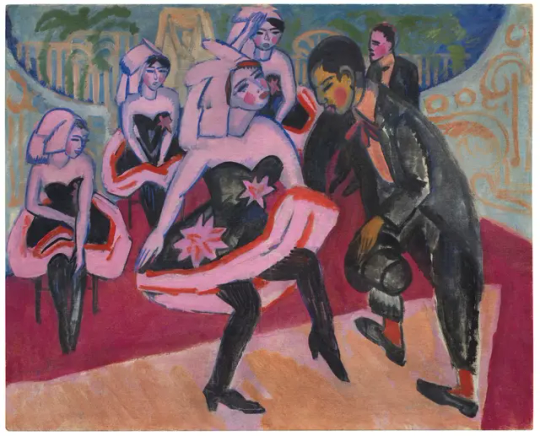
Ernst Ludwig Kirchner: «Tanz im Varieté« ( 1911)
Sensationsfund kommt für sieben Millionen nach Basel
Ernst Ludwig Kirchners «Tanz im Varieté» war 100 Jahre verschollen. Jetzt hat es die Basler Im-Obersteg-Stiftung gekauft. Sie wird es im Kunstmuseum Basel zeigen.
Christoph Heim, 20.06.2024
Der deutsche Expressionist Ernst Ludwig Kirchner (1880–1938) hat nicht nur die steilen Davoser Berge und Wälder gemalt, die in den Schweizer Museen so beliebt sind. Er hielt auch unzählige Grossstadtmotive fest, die in Dresden und Berlin entstanden. Eines seiner schönsten Tanzbilder malte er 1911. Es zeigt einen sogenannten Cakewalk zwischen einem schwarzen Tänzer und einer weissen Tänzerin, eingefasst von einer Gruppe weiterer Tänzerinnen und Tänzer.
Das Gemälde, das kürzlich von der Basler Stiftung Im Obersteg für fast sieben Millionen Euro gekauft wurde, ist eine Sensation. Es galt 100 Jahre als verschollen und war nur von frühen, in den 10er und 20er-Jahren des 20. Jahrhunderts entstandenen Fotografien bekannt. Am 7. Juni kam es bei Ketterer Kunst in München unter den Hammer. Bei der Auktion anwesend war die Kunsthistorikerin Géraldine Meyer, die seit zweieinhalb Jahren als Kuratorin bei der Stiftung Im Obersteg angestellt ist.

Versteigerung von «Tanz im Varieté» beim Auktionshaus Ketterer Kunst in München.
Eigentlich wollte Meyer schon am 3. Juni in München einen Augenschein nehmen. Das empfahl sich deshalb, weil das Bild 1945 von französischen Soldaten, die es auf einem Bauernhof entdeckt hatten, beschädigt worden war. Die Soldaten hatten, wie man in den Unterlagen des Auktionshauses nachlesen kann, die Kiste mit dem Bild gewaltsam geöffnet.
Der Schmuckrahmen des Werkes wurde zerstört. Ein Gewehrschuss traf den Kopf der Tänzerin ganz links im Bild. Und der Rumpf des schwarzen Tänzers wurde von einem Bajonett durchstochen. Offenbar wurden die Franzosen wütend, als sie das avantgardistische Gemälde sahen.
Die Auktion als Zitterpartie
Aber am 3. Juni meldeten München und Umgebung Land unter. Viele Zugstrecken waren wegen des Dauerregens lahmgelegt. Meyer entschloss sich darum, am Donnerstag, dem 6. Juni, mit dem Auto anzureisen und das Bild am Tag vor der Auktion zu inspizieren. Die Freude war gross, als sie das grosse, mit Schwarz, Rosa und Rot gemalte Gemälde, das 121 mal 148 Zentimeter misst, vor sich sah.
Die Schussverletzung war, wie im Auktionskatalog versprochen, kaum noch auszumachen. Am ehesten noch auf der Rückseite des Bildes. Und die Qualität der Malerei war hervorragend. Allerdings bedarf das Bild, bevor es im Museum aufgehängt wird, noch einer restauratorischen Überarbeitung.
Beinahe wäre der Ankauf im Auktionshaus aber gescheitert. Mit Meyer bot am Schluss nur noch eine Person am Telefon mit. Als Meyer bei 5,8 Millionen Euro schliesslich den Zuschlag bekam und sich am Ziel wähnte, legte die unbekannte Person am Telefon mit einem Gebot auf 5,9 Millionen Euro nach.
Das wollte der Auktionator nicht akzeptieren, weil die Auktion in 200’000er-Schritten erfolgt war. Der oder die Mitbietende am Telefon wollte aber nicht auf 6 Millionen erhöhen, sodass schliesslich die Basler den Zuschlag für das Bild erhielten. Mit Aufpreis, das ist jene Summe, die das Auktionshaus für die erfolgreiche Vermittlung einstreicht, sind es genau 6’958’000 Euro, welche die Stiftung Im Obersteg zu bezahlen hat.
Zuletzt vor 100 Jahren ausgestellt
Das Gemälde «Tanz im Varieté» war nahezu 100 Jahre in der Versenkung verschwunden. Kirchner selbst hatte es noch mehrfach fotografiert. Es wurde in mehreren Galerien ausgestellt und hing auch eine Zeit lang in Kirchners Haus in Davos. In den 1920er-Jahren verlieren sich die Spuren, bis es zwischen 1928 und 1931 von Max Glaeser, einem Emailfabrikanten in Kaiserslautern, erworben wurde.
Das Bild suchte schon damals einen Weg nach Basel: Kurz nach Max Glaesers Tod 1931 bot sein Nachlassverwalter das Bild dem Kunstmuseum Basel zum Kauf an. Entsprechende Briefe finden sich im Archiv des Museums. 1932 findet sich dort ein weiteres Verkaufsangebot. Der Konservator, der grundsätzlich Interesse signalisierte, musste aber passen, weil das Geld fehlte. Der Verkäufer verlangte stolze 5500 Reichsmark.
So blieb das Bild im Eigentum der Witwe Anna Glaeser. Nach ihrem Tod 1944 wurde es an einen badischen Schmuckdesigner verkauft. Kirchner galt bei den Nazis als entartete Kunst, weshalb besagter Designer seinen «Tanz im Varieté» auf einem Bauernhof versteckte, wo es wie erwähnt von französischen Soldaten beschädigt wurde. Erst nach der Restauration des Werkes in der Kunsthalle Karlsruhe übernahm der Schmuckdesigner es in seine Kunstsammlung.
In seinem beziehungsweise im Besitz seiner Nachkommen blieb das Bild die letzten 80 Jahre, bis die Erben es nun beim Auktionshaus Ketterer zur Versteigerung freigaben, das wie in der Branche üblich, weder Käufer noch Verkäufer namentlich nennt, ausser wenn diese es wie im Fall der Stiftung Im Obersteg ausdrücklich wünschen.
Der Tanz der schwarzen Sklaven
Mit Cakewalk ist ein Tanz gemeint, dessen Wurzeln sich bis in die Zeit der amerikanischen Sklaverei zurückverfolgen lassen. Ursprünglich waren es Afroamerikaner, die in Tanzwettbewerben die Tänze der weissen Herrschaft lächerlich machten. Das Siegerpaar soll jeweils einen Kuchen als Preis bekommen haben. Deshalb der Name Cakewalk.
Der Tanz breitete sich von den US-amerikanischen Südstaaten ausgehend aus und erreichte schliesslich auch Europa, wo afroamerikanische Tänzerinnen und Tänzer mit Ragtime-Rhythmen in städtischen Tanzlokalen auftraten und die Welt der bürgerlichen Gesellschaftstänze aufmischten. Auch Postkarten und satirische Werbegrafiken nahmen sich des Phänomens an, nicht selten mit rassistischen Untertönen.
Kirchner bediente sich bei seiner Motivwahl sowohl solcher Postkarten wie auch eigener Anschauung. Zahlreiche Skizzen sind überliefert, in denen er Details und ganze Kompositionen seines grossen Tanzbildes festhält. Offenbar war der Künstler fasziniert von diesen verrückten Tänzen, welche die Tanzbühnen in den Grossstädten der Jahrhundertwende eroberten.
Oder wie es die Kunsthistorikerin Marietta Piekenbrock in ihrem Essay im Auktionskatalog formuliert: «‹Tanz im Varieté› ist eine Hommage an das Goldene Zeitalter der Unterhaltungskünstler, die vor dem Ersten Weltkrieg mit ihren Showtänzen das Publikum in Ekstase versetzten.»
Das Gemälde wird voraussichtlich ab Herbst im Kunstmuseum Basel ausgestellt werden.
Das Kunstmuseum Basel erhält Kirchners «Tanz im Varieté» | Basler Zeitung

«Tanz im Varieté» von Ernst Ludwig Kirchner wird derzeit im Kunstmuseum Basel restauriert.
Sensation in der Kunstwelt-Verschollenes Kirchner-Bild mit Durchschuss neu in Basler Händen
Für sieben Millionen Euro hat eine Basler Stiftung ein Bild von Ernst Ludwig Kirchner ersteigert und lässt es nun restaurieren.
Tobias Bossard, 20.11.2024
Speziell ist nicht nur, dass ein verschollen geglaubtes Bild nach rund 100 Jahren wieder auftaucht. Sondern auch, dass auf dieses geschossen wurde.
Dass das Bild nach einer dramatischen Versteigerung bei der Basler Stiftung Im Obersteg landet, macht die Geschichte umso spezieller. Doch von Anfang an.
1911 malt Ernst Ludwig Kirchner das Bild «Tanz im Varieté» in Dresden. Es zeigt einen sogenannten Cakewalk. Der Tanz entstand um 1850 in den USA.
«Sklavinnen und Sklaven machten sich über die weisse Herrschaft lustig, indem sie die steifen Bewegungen und die ungelenke Art der Weissen nachäfften», erklärt Géraldine Meyer, Kuratorin der Stiftung Im Obersteg. «Mit der Zeit gab es auch Wettbewerbe, bei denen der beste Tänzer ein Stück Kuchen, einen Cake, gewann – daher der Name», so Meyer.
Der Cakewalk entwickelt sich zum Modetanz und kommt nach Europa. In einem Varieté in Dresden sieht Kirchner den Tanz und nimmt ihn als Vorlage für das Bild.
Als der deutsche Maler 1917 nach Davos zieht, nimmt er das Bild mit und hängt es in seinem Haus auf, wie verschiedene Fotos beweisen. 1923 wird das Bild letztmals in der Öffentlichkeit gesehen: an einer Ausstellung in Berlin. Danach verlieren sich die Spuren – bis in diesem Jahr das Bild an einer Auktion in München auftaucht.
Im Weltkrieg auf einem Bauernhof versteckt
Das Auktionshaus Ketterer hat die Geschichte des Bildes rekonstruiert. Um 1930 kauft es ein deutscher Emailfabrikant. Nach dessen Tod geht das Bild 1944 an einen badischen Schmuckdesigner. Dieser versteckt es in einer Kiste auf einem Bauernhof, da Kirchners Werke unter den Nationalsozialisten als entartete Kunst gelten.

Auf der Rückseite des Bildes sind der Einschuss und der Stich mit dem Bajonett gut sichtbar.
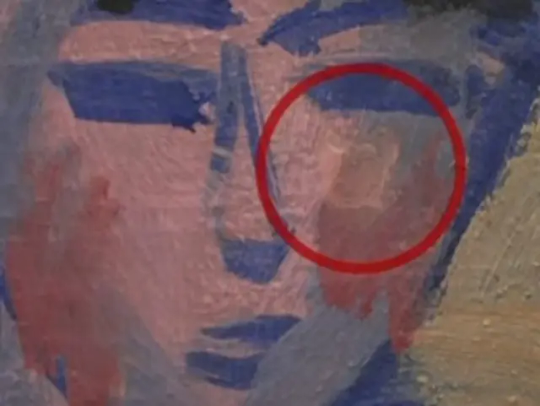
Von vorne sieht man jedoch kaum etwas, da das Schussloch und der Stich geflickt wurden. Nur wenn man ganz nahe herangeht, kann man das Schussloch entdecken, das ein französischer Soldat 1945 verursacht hat.

Noch schwieriger erkennbar ist der 13 Zentimeter lange Bajonett-Stich auf dem Bein des Tänzers.
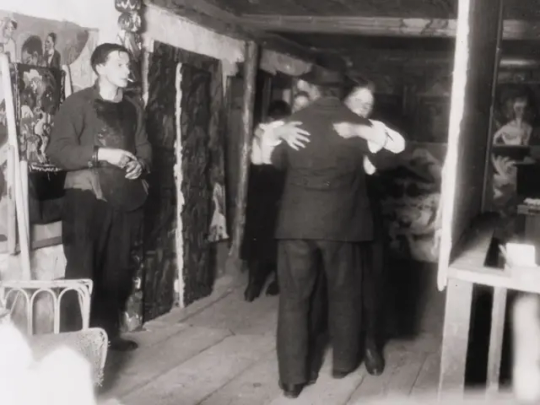
Als Ernst Ludwig Kirchner 1917 nach Davos ging, nahm er das Bild mit und hängte es in seinem Haus auf.
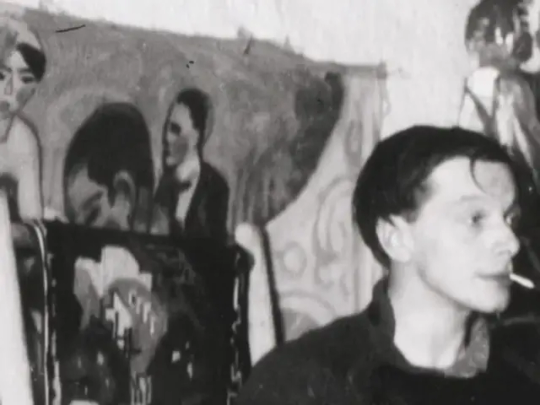
Damals war das Bild noch unbeschädigt. Allerdings rollte es Kirchner beim Umzug nach Davos auf die falsche Seite. Deshalb – und weil die Malschicht mittlerweile auch sonst fragil ist – wird es nun restauriert.
1945 entdecken französische Soldaten bei der Einnahme des Dorfes die Kiste mit dem Bild. «Wahrscheinlich aus Stress oder Übermut schiesst ein Soldat auf das Bild und schlitzt es mit dem Bajonett auf», sagt Hans Furer, Geschäftsführer der Stiftung Im Obersteg. Er schmunzelt: «Das Bild hat jetzt einen Schuss und einen Stich.»
Die Soldaten lassen das Gemälde zurück, sodass es in der Privatsammlung bleibt. Bis diesen Juni, als das Bild in München versteigert wird. Und die Auktion hat es in sich: «Das Bild wurde auf zwei bis drei Millionen Euro geschätzt. Aber wir waren überzeugt, es geht für viel mehr weg», erzählt Hans Furer. «Also legten wir einen Höchstwert von sieben Millionen fest – und genau für so viel erhielten wir das Bild.»
Glück für Basler: Auktionator bleibt hart
Die Basler Stiftung hat aber Glück. Denn der verbleibende Mitstreiter bietet 100'000 Euro mehr. Da jedoch nur 200'000er-Schritte erlaubt sind, fordert der Auktionator ein höheres Gebot. «Zuerst dachte ich: Oje, jetzt haben wir das Bild verloren», erzählt Kuratorin Géraldine Meyer, die vor Ort war.
«Weil der Auktionator keine Ausnahme zuliess, war der Gegenbieter wohl ein bisschen eingeschnappt und hat nicht weiter geboten. Das war ein richtiger Krimi.»
So passt der Erwerb des Bildes zur turbulenten Geschichte des Werkes, das ab Juni 2025 im Kunstmuseum Basel ausgestellt wird. Wer dann genau hinschaut, kann nicht nur den Cakewalk sehen, sondern auch Schuss und Stich entdecken.
Durchschuss und Stich werden nicht restauriert

Millimetergenaue Arbeit Die Schäden an der Malschicht werden unter dem Mikroskop behandelt. Die Restaurierung dauert insgesamt sechs Monate.
Das Bild «Tanz im Varieté» hat in all den Jahren gelitten. Deshalb wird es nun im Auftrag der Stiftung Im Obersteg rund sechs Monate lang vom Kunstmuseum Basel restauriert.
«Kirchner hat das Bild bei seinem Umzug in die Schweiz abgespannt und in die falsche Richtung gerollt. Dabei sind Schäden an der Malschicht entstanden, die wir noch heute sehen», sagt Restauratorin Esther Rapoport.
«Zudem ist das Werk generell sehr fragil, so dass in vielen Bereichen die Malschicht abzufallen droht. Darum müssen wir diese befestigen.»
Der Schuss und der Stich im Bild werden aber nicht angerührt. «Diese Schäden wurden früher einmal restauriert. Wir hingegen belassen diese so, da sie Teil der Werkgeschichte und des historischen Wertes des Bildes sind.»
Basler kaufen Bild von Kirchner mit Durchschuss und Dolchstoss - News - SRF
Schnitt und Schuss: Gemälde «Tanz im Varieté» hat viel durchgemacht

Alessandra Paone
Basel, 05.01.2025

Das Wichtigste in Kürze
Im Juni ersteigerte die Basler Stiftung Im Obersteg das Gemälde «Tanz im Varieté».
Seit Oktober wird dieses nun im Kunstmuseum Basel restauriert.
Die Stiftung stellt ihre Sammlung dem Kunstmuseum Basel als Leihgabe zur Verfügung.
Magdalena Ritler richtet die Taschenlampe auf eine feine, kaum wahrnehmbare Linie. Ein Schnitt. Dann schwenkt sie das Licht auf einen kleinen, hellen Fleck. Ein Schuss. Es sind Spuren der bewegten Geschichte eines besonderen Kunstwerks.
Ritler ist Restauratorin am Kunstmuseum Basel. Vor ihr liegt auf einem grossen Arbeitstisch das Bild «Tanz im Varieté» des deutschen Malers Ernst Ludwig Kirchner. Das Gemälde stammt aus dem Jahr 1911 und hat im Sommer europaweit für Aufsehen gesorgt.
Das Werk gilt während 100 Jahren als verschollen. Zuletzt ist es 1923 an einer Ausstellung bei Paul Cassirer in Berlin öffentlich zu sehen, danach verschwindet es von der Bildfläche – bis es 2024 an einer Auktion von Ketterer Kunst in München wieder auftaucht. Die Basler Stiftung Im Obersteg ersteigert es im Juni für fast sieben Millionen Euro, wie OnlineReports zuerst berichtete.
Seit Oktober wird «Tanz im Varieté» im Auftrag der Stiftung Im Obersteg von den beiden Gemälde-Restauratorinnen Esther Rapoport und Magdalena Ritler unter der Leitung von Caroline Wyss Illgen im Kunstmuseum Basel restauriert.
«Für mich ist das eine interessante Herausforderung und vor allem auch eine Riesenchance», sagt Ritler. Die 28-Jährige hat erst im vergangenen Jahr ihren Masterabschluss gemacht.
Zu fragil für Reisen
Die Stiftung Im Obersteg stellt ihre Privatsammlung, zu der nun auch «Tanz im Varieté» gehört, dem Kunstmuseum Basel als Leihgabe zur Verfügung und präsentiert sie zu einem grossen Teil auch dort.
Das restaurierte Bild soll am 2. Juni 2025 in der Ausstellung «Paarlauf» gezeigt werden. Danach kommt es in die Dauerausstellung des Museums. Dass das Gemälde auch in anderen Museen gezeigt wird, ist eher unwahrscheinlich. Es sei für Reisen zu fragil, sagt Géraldine Meyer.
Die Kuratorin der Stiftung Im Obersteg hat im Frühling das Gemälde bei Ketterer Kunst entdeckt und bei der Auktion in München schliesslich den Zuschlag erhalten.
«Tanz im Varieté» hat seit seiner Entstehung einiges durchgemacht. Als Kirchner 1917 von Deutschland nach Davos übersiedelt, reist auch das Werk mit. Seine Partnerin spannt es für den Transport vom Rahmen ab und rollt es in die falsche Richtung. Dadurch wird die dünne Malschicht beschädigt.
In einer Kiste versteckt
Nach mehreren Handwechseln gelangt das Werk 1944 in eine Privatsammlung in Baden-Württemberg. Dort bleibt es während 80 Jahren verborgen. Um es vor dem Naziregime zu schützen – Kirchners Kunst gilt zu dieser Zeit als «entartet» – versteckt es der Besitzer auf einem Bauernhof in einer Kiste.
Als 1945 französische Truppen einmarschieren und das Bild finden, schiesst ein Soldat darauf und schlitzt es mit einem Bajonett auf.
Die beschädigte Leinwand wird später restauriert. Ritler zeigt Fotos von der Rückseite des Gemäldes. Darauf sieht man die geflickten Stellen. Diese belasse man so, sagt die Restauratorin. Sie seien Teil der Werkgeschichte und hätten einen historischen Wert.
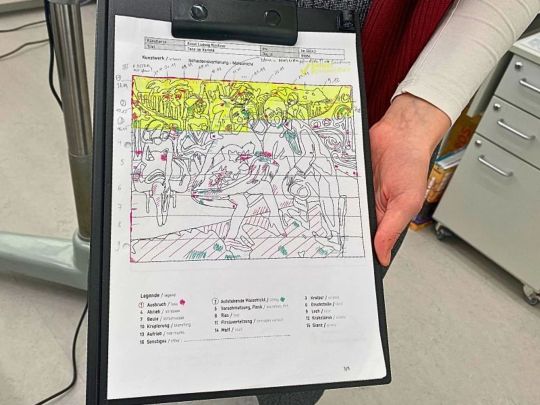
Ritler hat das Bild mit Schnüren in verschiedene Segmente unterteilt. Diese Unterteilung ist auch auf der sogenannten Kartierung ersichtlich.
Das ist eine Zeichnung des Gemäldes, auf dem die Schäden und Arbeitsschritte dokumentiert sind. Das dient der Restauratorin zur Orientierung. «Damit ich mich nicht verliere und zweimal dieselbe Stelle bearbeite.»
Bevor sie mit der eigentlichen Restaurierungsarbeit beginnen konnte, haben die Restauratorinnen das Gemälde gemeinsam mit anderen Mitarbeitenden des Kunstmuseums, wie etwa aus der wissenschaftlichen Fotografie, analysiert.
Mit Infrarot- und Röntgenaufnahmen haben die Spezialistinnen und Spezialisten die Schichten des Werks untersucht.

Man weiss etwa, dass Kirchner seine fertigen Werke zum Teil überarbeitete – manchmal erst viele Jahre nach ihrer Entstehung.
Es sei wichtig, Retuschen des Malers zu erkennen, sagt Ritler. Im Gegensatz zu fremden Nachbesserungen, die man beseitige, lasse man diese bestehen.
Leuchtende Farben und matte Malerei
Ritler arbeitet vor allem unter dem Mikroskop. Mit einer Art Mini-Staubsauger befreit sie das Gemälde von Schmutz und entfernt kleine, dunkle Flecken. So kämen die für Kirchners Kunst charakteristischen leuchtenden Farben und die matte Malerei besser zum Ausdruck.
Dabei achtet die Restauratorin aber darauf, nicht zu viel abzutragen, denn wie das Einschussloch und der Schnitt gehöre auch die über die Jahre hinweg gebildete Patina zum Bild. Bis es wieder auftauchte, kannte man «Tanz im Varieté» nur als Abbildung auf Schwarz-Weiss-Fotografien.
Kirchner gestaltete für fast alle Gemälde, die er verkaufte, einen Rahmen; für ihn gehörte dieser untrennbar zum Bild. Der Rahmen von «Tanz im Varieté» ist aber nicht mehr vorhanden. Gemäss Nachforschungen von Ketterer Kunst wurde er wahrscheinlich im Zweiten Weltkrieg zerstört.

Die Stiftung Im Obersteg hatte bislang kein Kirchner-Gemälde – obwohl Karl Im Obersteg und der deutsche Maler sich kannten und Briefkontakt pflegten.
Die rund 20 Schriftwechsel befinden sich im Archiv der Stiftung. Mit «Tanz im Varieté» habe man nun diese Lücke schliessen können, sagt Géraldine Meyer.
Tiefer Schätzwert
Kunstkenner kritisieren, die Stiftung habe für das Gemälde «zu viel Geld» ausgegeben. Die Kuratorin wehrt sich gegen diesen Vorwurf. Mit zwei bis drei Millionen Euro sei der Schätzwert viel zu tief angesetzt gewesen. Das habe auch das Auktionshaus Ketterer gewusst.
Im Gegensatz zur Stiftung besitzt das Basler Kunstmuseum bereits eine Skulptur und drei Gemälde von Kirchner: «Davos im Winter», «Stafelalp. Rückkehr der Tiere» und «Amselfluh». Sie stammen alle aus der Davoser Zeit des Künstlers und legen den Fokus auf die Berge und Wälder des Bündner Ferienorts.
Vor seinem Umzug in die Schweiz hat Kirchner in Dresden und Berlin viele Stadtmotive gemalt. «Tanz im Varieté» ist eines davon und mit 120 auf 145 Zentimetern laut Ketterer «eines der aussergewöhnlich grossformatigen Bilder im Werk Kirchners». Der Expressionist habe damit seine Faszination für den Tanz zum Ausdruck gebracht.
Das Bild zeigt einen sogenannten Cakewalk zwischen einem schwarzen Mann und einer weissen Frau. Der Gesellschaftstanz entstand um 1850 in den USA.

Wie jetzt bekannt geworden ist, wurde das Gemälde dem Basler Kunstmuseum in den frühen 30er-Jahren zweimal zum Kauf angeboten; einmal von den Nachlassverwaltern des damaligen Besitzers, eines Emailwaren-Fabrikanten und Kunstsammlers, und einmal von der Mannheimer Galerie Buck, die das Werk in Kommission hatte.
Der damalige Museumsdirektor Otto Fischer hätte es gerne erworben, doch sei die Kunstkommission dagegen gewesen, vor dem Krieg so viel Geld auszugeben, erzählt Meyer. Nun schliesst sich der Kreis wieder.
Ob damit auch das letzte Kapitel der Geschichte dieses Werks geschrieben ist? Selbst wenn der Wert des Bildes durch die Restaurierung und die Ausstellung steige, habe die Stiftung nicht vor, es wieder zu verkaufen, sagt Meyer.
Die turbulente Vergangenheit zeigt aber: Bei «Tanz im Varieté» ist alles möglich.
Schnitt und Schuss: Gemälde «Tanz im Varieté» hat viel durchgemacht | Nau Basel
#kirchner#sensation#verschillen#schuss#hieb#restauration#beschädigt#davos#tanz im varieté#tanz#varieté#topp
1 note
·
View note
Quote
Glaeser ら (2004) は、ヨーロッパ人が定住できた場所には、彼らは単に財産権やその他の制度をもたらしたのではなく、彼ら自身ももたらしたと指摘しました。Glaeser らは、制度の成長効果と人的資本の成長効果、つまり、単に自国にヨーロッパ系の人々が大勢いることによる効果を経験的に切り離すことは不可能であると指摘しています。 AJR の有名な結果に対するこの代替説明はこれまで一度も否定されたことがなく、非常に重要であるため、ノーベル委員会は賞の発表時にこれに関する免責事項を発表する必要があると判断しました。 「この結果は研究者の仮説を証明するものではなく、実際のところ仮説は証明できないかもしれませんが、強い示唆を与えるものであるため、とにかくノーベル賞を授与します」と言っているようなものです。経済学を哲学の一分野ではなく科学として捉えたいのであれば、このようなことは書きたくありません! ノーベル委員会は、2002 年の AJR の 2 番目の有名な論文「運命の逆転: 現代世界の所得分配の形成における地理と制度」を引用して、この動きを擁護しています。その論文で AJR は、植民地化前に豊かだったヨーロッパの植民地は植民地化後に貧しくなり、植民地化前に貧しかった植民地は植民地化後に豊か��なったことを示しています。そして富と貧困の尺度として、彼らは都市化を使用しています。 AJR の主張は、1500 年から 1995 年の間に富裕な場所と貧困な場所が逆転したため、地理では富と貧困を説明できないということであり、むしろ制度が原因に違いないというものである。 しかし、これは他の有名な論文と同じ問題を抱えています。米国、カナダ、オーストラリアのような場所、つまり後に豊かになった「貧しい」植民地は、ヨーロッパ人とその子孫でいっぱいになった場所です。 1500年に都市化が進み、後に貧しくなった場所、エジプト、メキシコ、ベトナムなどは、おそらくすでに多くの人が住んでいた(または熱帯病が多かった、など)ため、大量のヨーロッパ人が移住しなかった場所です。
大きな大きな疑問に対するノーベル賞 - ノア・スミス
1 note
·
View note
Text
The Sunnydale Herald Newsletter, Saturday, February 17th
LINDSEY: So this place works for you? DRUSILLA: Oh, yeah. (She moves one hand in a circular motion above Darla's body) Grandmother is very pleased with it. - I can tell. - Aren't you, Grandmother? (Leans down over Darla) My daughter. LINDSEY: Can she hear you? DRUSILLA: (turns to him) She's dead. LINDSEY: Oh - of course.
~~Reunion~~
[Drabbles & Short Fiction]

Weekly Drabbles #84 — Compromise by veronyxk84 (Buffy/Spike, PG-13)

The Very Sinister Sewing Circle by Mayalaen (Angel, Lindsey, multiple crossovers, G)

Des fleurs pour la St Valentin by Miss Kitty (G, in French)
[Chaptered Fiction]

In the Know, Chapter 3 (complete!) by fifthhollow (Willow, Rizzoli & Isles crossover, T)
Sunnydale Serenade, Chapter 10 by TheRealJeanGenie (Buffy/Spike, T)
Thirty-ish Days (and Thirty-ish Years), Chapter 25 by Dynapink (Buffy/Giles, T)
A Reincarnation in Sunnydale, Chapter 29 by DracoRim98 (Buffy/Angel, M)
Spidey Does Buffy the Vampire Slayer, Chapter 28 by megamatt09 (Buffy/ Peter Parker, Spiderman crossover, E)
Les deux Phénix, Chapter 11 (complete!) FridayQueen (Buffy/Faith, M, in French)
They Know Exactly What We're Here For, Chapter 8 by MadeInGold (Angel/Riley/Spike, E)
Raven, Chapter 3 by sparrow2000 (Xander & Spike, G)
You knew, Chapter 2 (complete!) by DancingAngel0013 (Buffy/Giles, E)
The Boring Stuff: Some Assembly Required, Chapter 1 by missfiggy (Buffy/Angel, T)
Worth Fighting For, Chapter 10 by melodys_muse (Buffy/Angel, T)

A Vampire and a Slayer Walk Into a Park... Chapter 15 by holetoledo (Buffy/Spike, Adult Only)
Afterburn, Chapter 14 by Melme1325 (Buffy/Spike, NC-17)
Beg, Chapter 4 by Maxineeden (Buffy/Spike, NC-17)

One Prince In Sunnydale, Chapter 13 by DrThothEvans (Xander, the Chronicles of Amber crossover, FR18)
Xander Harris and the Little Pink Pill, Chapter 6 by KyliaQuilor (Xander/Cordelia, FR21)
Easy Street, Chapter 15 by Arke (Faith, The Walking Dead crossover, FR18)

The Ring Talks, Chapter 38 by myrabeth (Buffy/Spike, 13+)

What the Drabble? Chapter 84 by VeroNyxK84 (Buffy/Spike, R)
Early One Morning, Chapter 16 by all choseny (Buffy/Spike, NC-17)
Love Lives Here, Chapter 24 by Passion4Spike (Buffy/Spike, NC-17)
Coming Through, Chapters 30-34 by hulettwyo (Buffy/Spike, Adult Only)
[Images, Audio & Video]

Artwork: Drusilla/Spike by genericaces (Warning: blood and mild gore)

Banner: Buffy/Spike by veronyxk84 (worksafe)

Artwork: ats characters as animals by artsying-ifer (worksafe)
Artwork: Coloring page of Anya and Buffy in "Entropy" by amazzyblaze (colouring) and amazzyblaze's husband (line art) (worksafe)
Cartoon: Angel and Cordelia by genericaces (worksafe)
Icons: Dawn Summers by pridewishes (worksafe)

Fanvid: Wanna Be Your Slave by Nina When it Rains (Buffy/Spike)
Fanvid: Bad Touch by Nina When it Rains (Buffy/Spike, age-restricted)
Fanvid: Buffy and Angel - Slut by juliaroxs241
Fanvid: Buffy & Spike || BTVS || Animals by Marialeluligsr
Fanvid: Buffy: The Vampire Slayer! The greatest hunter in the world! The world will never forget! by Old TV Show
Fanvid: BTVS || Spuffy || Take Me To Hell || HD by Narcia Lily
Fanvid: Willow + Tara All I wanted was you by arfidev
Fanvid: [Buffy & Spike] it goes on and on and on by Sari Glaeser
Fanvid: Faith Lehane - You’re On Your Own Kid (Taylor Swift) by Minute Long T Swift Edits
Fanvid: Buffyverse - A World Without Danger by juliaroxs241
Fanvid: Buffyverse - You Don't Own Me by juliaroxs241
Fanvid: Klaus Being a Pain in Buffy's Ass (for the most part) by Bobblehead89 (The Vampire Diaries crossover)
Vidlet: "How You Try..." by Shannon Rey (Buffy/Spike)
Vidlet: buffy 🔛🔝 by Demi sadler
Vidlet: Buffy x Spike ❤️Valentines Day Edit❤️ by Shannon Rey
Cosplay video: Hi, I’m Buffy, the Vampire Slayer. And you are? by Valeria Sweet
Video: Buffy the Vampire Slayer Revival Season 10 Episode 11: Ripper by Buffy the Vampire Slayer Chosen
Music: Buffy theme & "I've Got A Theory" - Halloween Covers Night - 2006 by TheBonkers
Music: Soundtrack Cover: Buffy the Vampire Slayer theme by Revan Varen
[Reviews & Recaps]

Video: Buffy the Vampire Slayer • The Next Reel by TruStory FM
Video: All the Way-Slayer Sunday by Jane Talks Buffy
Video: Sunnydale Live #8: Buffy S1E7: Angel by The Uncanny Fans
[Search]

Any fuffy fic recs? by dob-the-destroyer
[Fandom Discussions]

One thing I do appreciate about Buffy season 12 by oveliagirlhaditright
Faith Lehane by sharpestasp

LMPTM - Interogation or Therapy by NoShip
Should Buffy have put those bitcas in their places? continued by NoShip

Songs that fit different verse relationships continued by multiple posters
Best surprise plot twists on Buffy and Angel? by American Aurora
Buffy TV Show - reboot or continuation? by American Aurora

Why is season 4 [of Angel] so bad? by Perfect-Resist5478
Charisma always did fantastic at doing the vision pain by dabzandjabz
I fucking love this show [Angel] so far by Bamf102
why would tptb send cordelia back if they knew she was possessed by jasmine by HaileeSteinfeldbf
How would it have been like if Buffy appeared in "You're Welcome" as originally intended? (2) by Night-Caelum
Anyanka Voice Actress by Ecstatic_Speaker7473
Worst episode [of Buffy]? by poopsmcbuttington
Your unpopular opinion by triryche4
Dr. Riley Mengele over here by alrtight
This is how a normal person would react to Drusilla. Spike is (dare I say it) saint-like for how he puts up with her by SpoonFullOfStupid
Let’s talk about Darla!! by Sweet-Siren
Drusilla's visions/part demon by kevco185
has anyone watched buffy dubbed? by likeshinythings
This line [Spike about Woodstock] lives rent free in my head by Significant_Sky6386
What line or event gave you the cringe? by WanderlingInker
Anne [Ken] by Neat-Biscotti-2962
I love that Buffy has to continue to train to keep up her skills by The_ZombyWoof
Say something nice about the Buffy movie (1992) by ginime_
Buffy The Vampire Slayer and/or Angel Events Swapped? by Big-Restaurant-2766
How would it have been like if Buffy appeared in "You're Welcome" as originally intended? by Night-Caelum
Who Had The Worst Performance in the Entire Series? by Jaxsonj01
Treatment of Faith vs Willow by rad619
Anya by IsaystoImIsays
Submit a link to be included in the newsletter!
Join the editor team :)
2 notes
·
View notes
Text
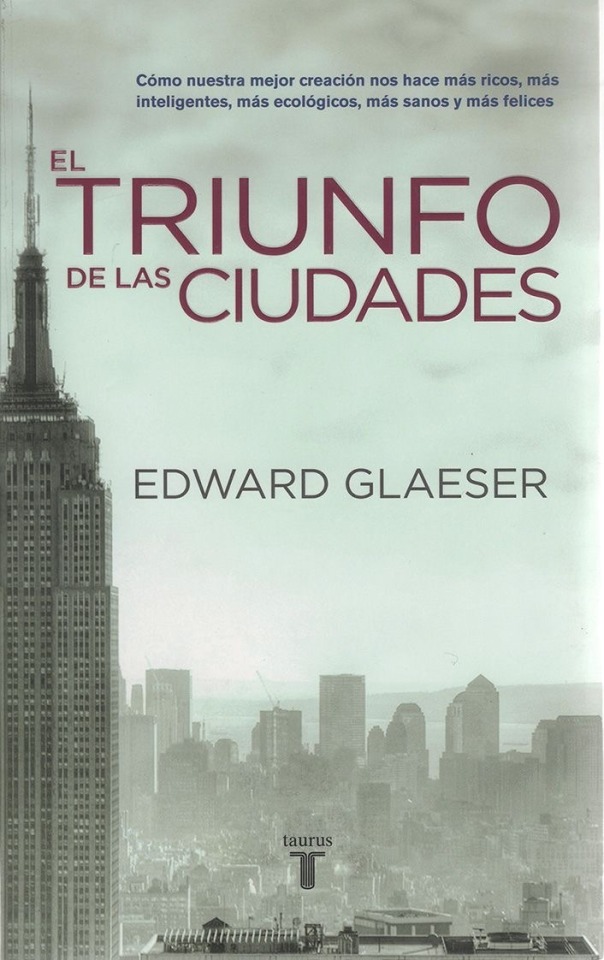
El triunfo de las ciudades” (título original: Triumph of the City) es un libro del economista Edward Glaeser, que presenta una defensa apasionada de las ciudades como motores de innovación, crecimiento económico, y progreso humano. Aquí tienes una opinión general sobre el libro:
Puntos positivos:
• Argumento sólido y bien fundamentado: Glaeser utiliza datos, ejemplos históricos y análisis económicos para demostrar cómo las ciudades fomentan la creatividad, la productividad y el desarrollo.
• Perspectiva optimista: El autor ve a las ciudades no como problemas (por el crimen, la contaminación o el hacinamiento), sino como soluciones que concentran talento, oportunidades y eficiencia.
• Crítica a la expansión suburbana: Glaeser argumenta en contra del urbanismo disperso, promoviendo una mayor densificación como camino hacia una sociedad más sostenible y equitativa.
• Lenguaje accesible: Aunque trata temas complejos, el estilo es claro y ameno, lo que lo hace accesible incluso para lectores que no son expertos en economía o urbanismo.
Críticas o puntos debatibles:
• Foco promercado: Algunos lectores consideran que su enfoque excesivamente favorable al mercado ignora los problemas de desigualdad, gentrificación o desplazamiento que también se dan en las ciudades exitosas.
• Visión un tanto centrada en EE.UU.: Aunque menciona ciudades de otros países, su análisis se basa principalmente en casos estadounidenses.
0 notes
Text
triunfo de las ciudades

glaeser-el-triunfo-de-las-ciudades.pdf
Edward Glaeser es profesor de economía en la Universidad de Harvard y defensor del Nuevo Urbanismo. Su trabajo se centra en las ciudades, la vivienda, la obesidad, la delincuencia, la innovación y otros temas desde la perspectiva de un economista; ha escrito mucho sobre temas urbanos para The New York Times. Para describir con precisión las historias de este libro, Glaeser ha visitado muchas ciudades de todo el mundo con el fin de estudiar con gran detalle la vida de sus habitantes y su evolución económica, social y medioambiental. En el libro el triunfó de las ciudades, el autor se presentó con una postura clara sobre como las ciudades como un motor de innovación, crecimiento económico y humano. Se nos presentó como una persona que ve a los seres humanos como un factor importante en el crecimiento de una ciudad, por lo cual, se puede argumentar que una ciudad no solo la conforman las cantidades inmensas de infraestructura construidas en ellas o el capital que conforma dichas ciudades para su evolución, si no, en lo capacitados que estén los ciudadanos para saber manejar su economía a través de sistemas normativos que permitan llevar su efectiva convivencia y su adecuado nivel de vida. Por lo cual podemos observar en su obra que la urbanización no se presenta como una amenaza para la humanidad, por el contario lo toma como una oportunidad para reducir la pobreza, combatir desastres naturales, cambios climáticos, mejorar la calidad de vida global Nos brinda a través del libro varias problemáticas que se presentaron durante la urbanización de las ciudades y el poco alcance del gobierno que tenía ante los problemas al carecer de leyes que hubieran que regularizarlas por lo mismo de que iban surgiendo a medida que los pueblos se modernizaban como es el caso de vías públicas, la delincuencia, el modo de trasporte, diversas crisis económicas o la modernización que presentaron los trabajos. Su crítica a las regulaciones excesivas que limitan el crecimiento urbano y excluyen a los más pobres también puede verse a través del lente del derecho a la vivienda adecuada, consagrado en instrumentos como el Pacto Internacional de Derechos Económicos, Sociales y Culturales. Al abogar por una planificación urbana más racional y justa, Glaeser propone indirectamente que los Estados deben armonizar sus políticas urbanas con sus obligaciones internacionales en materia de derechos humanos. En definitiva, Glaeser sostiene que el futuro de la humanidad es inevitablemente urbano, y que abrazar esa realidad con políticas inteligentes no es solo una cuestión de eficiencia económica, sino también una responsabilidad jurídica y ética en un mundo globalizado. Las ciudades, afirma, no son el problema: son la solución
0 notes
Text
DATOS Y CURIOSIDADES
Encontre un libro que puede ser interesante para ti, te dejo algunos detalles y un resumen del libro que tal vez haga que quieras leerlo.
"El Triunfo de las Ciudades" (título original: Triumph of the City) es una obra escrita por Edward Glaeser, un economista estadounidense. Publicada en 2011, este libro explora el papel crucial de las ciudades en la prosperidad económica, social y cultural de los individuos y las naciones. A través de su análisis, Glaeser argumenta que las ciudades son el motor de la innovación, el crecimiento económico y el progreso humano. En vez de ser vistas como problemas, Glaeser las presenta como soluciones a muchos de los desafíos del mundo moderno.
A continuación, te explico algunas de las ideas más destacadas del libro.
Principales ideas y temas del libro
Las ciudades como centros de innovación Glaeser sostiene que las ciudades son el corazón de la creatividad. En lugar de tratarse de lugares congestionados y problemáticos, las ciudades son espacios donde las ideas se encuentran, se desarrollan y prosperan. Esto se debe a la interacción de las personas, la diversidad y la concentración de talentos. Las ciudades permiten que los individuos compartan conocimiento y colaboren de formas que no serían posibles en entornos más dispersos.
El rol de la densidad Una de las principales tesis del libro es que la alta densidad de población en las ciudades facilita la creación de redes sociales, de negocios y de intercambios de ideas. La concentración de personas en áreas urbanas impulsa la innovación tecnológica, la creación de empleos y la generación de capital humano. Glaeser utiliza ejemplos históricos de ciudades como Nueva York o Londres para ilustrar cómo la densidad y la cercanía fomentan el intercambio de ideas.
El poder de la educación y el capital humano Glaeser argumenta que el capital humano (es decir, el conocimiento y las habilidades de las personas) es la clave para el éxito de las ciudades. Cuanto más educada y calificada sea la población de una ciudad, más fácil será para ella adaptarse a los cambios económicos y generar innovación. Las universidades, las escuelas técnicas y las oportunidades de formación continua en las ciudades son esenciales para el crecimiento.
La importancia de la infraestructura El libro subraya también el papel de las infraestructuras urbanas en el éxito de las ciudades. El transporte público, la energía, la tecnología y las comunicaciones son cruciales para mantener la competitividad de las ciudades. Una ciudad bien conectada con una infraestructura eficiente tiende a ser más próspera.
La ciudad frente al campo Glaeser hace una comparación entre las ventajas de vivir en las ciudades frente a la vida rural. Si bien las áreas rurales fueron el centro de producción en siglos pasados, las ciudades modernas permiten la creación de una mayor riqueza, empleo y creatividad. Además, el trabajo rural está perdiendo relevancia en un mundo cada vez más urbanizado y tecnológico.
La pobreza urbana y la desigualdad A pesar de celebrar las ciudades, Glaeser también reconoce que las ciudades no son perfectas. Existen problemas de desigualdad, pobreza urbana y desempleo. Sin embargo, sugiere que estos problemas pueden ser resueltos a través de políticas públicas que promuevan la educación, la seguridad y la inclusión social. Las ciudades pueden ser el lugar de oportunidad para los más desfavorecidos, si se implementan las políticas correctas.
El desafío de la gobernanza urbana Un tema recurrente en el libro es el gobernante que administra bien una ciudad. Glaeser cree que una buena gobernanza es fundamental para el éxito de las ciudades. Las políticas públicas deben enfocarse en la educación, la seguridad y en hacer que los mercados funcionen correctamente. El gobierno debe crear condiciones para que las ciudades puedan prosperar y ser inclusivas.
El futuro de las ciudades Glaeser termina el libro con una reflexión sobre el futuro de las ciudades. A medida que el mundo se urbaniza más, las ciudades seguirán siendo lugares clave para la innovación, la economía global y el desarrollo humano. Las megaurbes podrían enfrentarse a desafíos, pero la historia ha demostrado que las ciudades se reinventan y prosperan continuamente.
Relevancia y Contribución del Libro
"El Triunfo de las Ciudades" se diferencia de otros estudios sobre urbanización porque no aborda únicamente los problemas de las ciudades, sino que enfatiza sus ventajas. Glaeser ofrece una perspectiva optimista sobre el futuro urbano, destacando el potencial humano y la capacidad de las ciudades para adaptarse a los cambios.
El libro es particularmente útil para aquellos interesados en la economía urbana, la sociología urbana y la planificación de políticas públicas, ya que presenta un análisis basado en datos y ejemplos históricos, además de ser una defensa apasionada de las ciudades como motor de desarrollo.
0 notes
Text
Francis Dillon, Edward Glaeser, and William Kerr of Harvard find that segregation by educational level in American workplaces has risen over the past two decades. They find that the dissimilarity index—the share of non-college workers that would need to shift establishments to create an even educational distribution—increased from 51.9% to 55.0% between 2000 and 2020; by comparison, a comparable index of racial segregation was 53% in a typical large metro area in 2020. While the overall workforce has become more educated, non-college workers are increasingly concentrated in workplaces with fewer college-educated peers. This trend is more pronounced among younger and male workers and is growing the fastest in service-producing industries, where firms are more likely to outsource operations typically performed by non-college educated workers. This growing isolation may limit opportunities for workers without college degrees to learn skills from their college-educated peers, potentially affecting their future earnings.
6 notes
·
View notes
Text
El triunfo de las ciudades de Edward Glaeser es un libro que explora cómo las ciudades han sido esenciales para el progreso humano, tanto económica como socialmente. Glaeser argumenta que, a pesar de los desafíos que enfrentan las áreas urbanas, como la pobreza y la congestión, las ciudades siguen siendo los motores más efectivos de innovación, creatividad y crecimiento económico. El autor utiliza una gran cantidad de datos históricos y ejemplos modernos para respaldar su tesis, enfocándose en cómo la proximidad geográfica en las ciudades favorece el intercambio de ideas y la colaboración, lo cual impulsa la prosperidad.
El libro también aborda temas como la importancia de la educación, la infraestructura y el capital humano en el éxito de las ciudades, y cómo la densidad urbana puede ser un factor positivo, a pesar de las críticas que a menudo recibe. Además, Glaeser subraya el papel de la tecnología y las políticas públicas en la evolución de las ciudades y su capacidad para adaptarse a los cambios.
El triunfo de las ciudades es una reflexión sobre el valor de las ciudades como centros de interacción humana, innovación y desarrollo económico, defendiendo su relevancia frente a la tendencia de algunas personas de buscar vivir en áreas rurales o suburbanas.

0 notes
Text
El triunfo de las ciudades de Edward Glaeser defiende que las ciudades son lugares que mejoran la calidad de vida de las personas, la economía y el medio ambiente. El libro busca romper con los mitos que rodean a las ciudades.
0 notes
Text
“El triunfo de las ciudades” es una obra del economista Edward Glaeser que explora cómo las ciudades han sido fundamentales en el desarrollo humano, argumentando que vivir en entornos urbanos nos hace más ricos, inteligentes, ecológicos, saludables y felices. 
Glaeser destaca que las ciudades fomentan la innovación y el crecimiento económico al concentrar talento y facilitar interacciones cara a cara, lo que impulsa la colaboración y el intercambio de ideas. Además, sostiene que la vida urbana, al promover el uso del transporte público y reducir las distancias de desplazamiento, puede ser más sostenible y respetuosa con el medio ambiente que la vida en áreas rurales o suburbanas.  
El autor también aborda los desafíos que enfrentan las ciudades, como la congestión, la contaminación y la desigualdad, pero enfatiza que, a pesar de estos problemas, las ciudades siguen siendo motores esenciales de progreso y bienestar humano. 
En resumen, Glaeser presenta una defensa apasionada de la vida urbana, subrayando que las ciudades, al facilitar la cercanía y la interacción entre las personas, potencian nuestras capacidades y contribuyen significativamente al avance de la sociedad.

0 notes